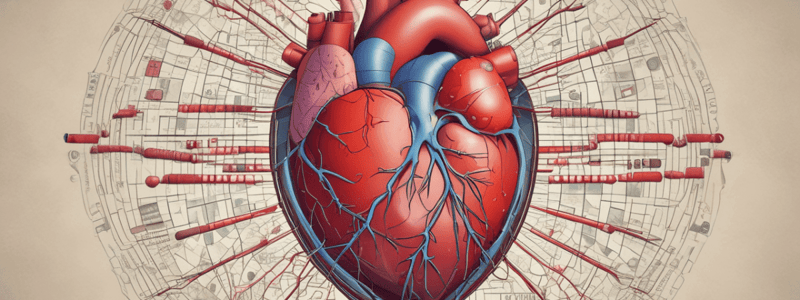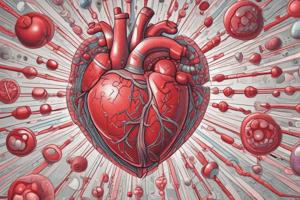Podcast
Questions and Answers
What is the effect of Propranolol on heart rate?
What is the effect of Propranolol on heart rate?
- It initially increases then decreases heart rate
- It increases heart rate
- It has no effect on heart rate
- It decreases heart rate (correct)
What is the mechanism of action of Nitroglycerin?
What is the mechanism of action of Nitroglycerin?
- It increases heart rate by stimulating the beta receptors
- It inhibits smooth muscle contraction by releasing nitric oxide (correct)
- It relaxes smooth muscle by increasing calcium influx
- It constricts blood vessels by increasing blood pressure
What is the main adverse effect of Propranolol?
What is the main adverse effect of Propranolol?
- Increased heart rate
- Increased blood pressure
- Cardiac failure
- Bronchi-constriction (correct)
What is the route of administration of Propranolol?
What is the route of administration of Propranolol?
What is the effect of Nitroglycerin on blood pressure?
What is the effect of Nitroglycerin on blood pressure?
What is the half-life of Propranolol?
What is the half-life of Propranolol?
What is the main effect of digoxin on the heart?
What is the main effect of digoxin on the heart?
What is the mechanism of action of digoxin?
What is the mechanism of action of digoxin?
What is the therapeutic use of digoxin?
What is the therapeutic use of digoxin?
What is the effect of aspirin on platelet function?
What is the effect of aspirin on platelet function?
What is the primary reason for using low-dose aspirin?
What is the primary reason for using low-dose aspirin?
What is the mechanism of action of heparins?
What is the mechanism of action of heparins?
What is the mechanism of action of aspirin?
What is the mechanism of action of aspirin?
What is the antidote for heparin overdose?
What is the antidote for heparin overdose?
What is the duration of action of aspirin on platelets?
What is the duration of action of aspirin on platelets?
What is the primary mechanism of action of warfarin?
What is the primary mechanism of action of warfarin?
What is the consequence of warfarin-induced skin necrosis?
What is the consequence of warfarin-induced skin necrosis?
What is the typical incidence of thrombosis in heparin-induced thrombocytopenia?
What is the typical incidence of thrombosis in heparin-induced thrombocytopenia?
Study Notes
Cardiovascular Drugs
Beta Blockers - Propranolol
- Non-selective β-antagonist, used to treat angina, hypertension, arrhythmias, and glaucoma
- Inhibits contraction of the heart by blocking β1 receptors, reducing heart rate and force of contraction
- Adverse effects: bronchi-constriction, cardiac failure, fatigue, and depression
- Route of administration: oral, with a half-life of 4 hours and high first-pass metabolism
Vasodilators - Nitroglycerin
- Dilates blood vessels, reducing blood pressure and workload on the heart
- Converted to nitric oxide (NO) by mitochondrial aldehyde dehydrogenase (MtALDH)
- Route of administration: intravenous, sublingual, with a peak concentration time of approximately 4.4 minutes
- Adverse effects: hypotension, vertigo, flushed skin, diaphoresis, fever, syncope, dyspnea, and bradycardia
Cardiac Glycosides - Digitalis (Digoxin)
- Increases force of contraction of the heart, used to treat congestive cardiac failure (CCF)
- Extracted from the foxglove plant (Digitalis spp.), with digoxin being the main drug in this class
- Acts on the heart, increasing intracellular Ca²⁺ concentrations, which leads to increased force of contraction
- Adverse effects: arrhythmia (tachycardia, atrioventricular block), hypokalemia, abdominal discomfort, nausea, and vomiting
- Route of administration: oral or intravenous, with a half-life of 36-40 hours
Antiplatelets - Aspirin
- Prevents clotting of blood by inhibiting the synthesis of thromboxane A2 (TXA2) in platelets
- Irreversible inhibition of cyclooxygenase (COX) enzyme, specifically COX 1 in platelets
- Route of administration: oral, with a dose of 160-320 mg/d, and a duration of 7-9 days
- Adverse effects: GIT irritation, and used at low doses to prevent platelet aggregation
Anticoagulants - Heparin and Low Molecular Weight Heparin (LMWH)
- Prevent clotting of blood by inactivating clotting factors IIa, IXa, Xa, XIa, and XIIa
- Inhibit coagulation cascade, preventing fibrin formation and blood clotting
- Route of administration: intravenous, subcutaneous, with a low therapeutic index
- Adverse effects: osteoporosis, hyperkalemia, hypersensitivity reactions, and heparin-induced thrombocytopenia
Anticoagulants - Warfarin
- Inhibits blood clot formation by preventing the synthesis of clotting factors II, VII, IX, and X
- Structurally related to vitamin K, with a slow onset of 48 hours and a peak anticoagulant effect at 72-96 hours
- Route of administration: oral, with a half-life of 25-60 hours, and a high plasma protein binding of 99%
- Adverse effects: diarrhea, bleeding, warfarin-induced skin necrosis, and a low therapeutic index
- Monitored using prothrombin time (PT) and international normalized ratio (INR)
Studying That Suits You
Use AI to generate personalized quizzes and flashcards to suit your learning preferences.
Related Documents
Description
Test your knowledge of cardiovascular drugs, including their mechanisms of action and effects on the heart and blood vessels. This quiz covers a range of medications, from beta blockers to anticoagulants, and their roles in managing cardiovascular health.




